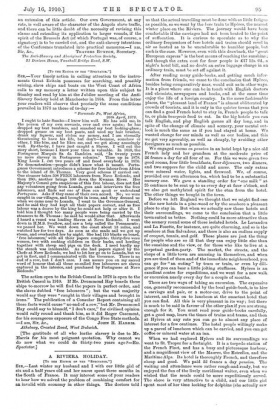[To THE EDITOR OF THE "SPECTATOR:1
Silk—Your timely action in calling attention to the instru- ments Great Britain possesses for searching, and possibly seizing, slave ships and boats on the West Coast of Africa calls to my memory a letter written upon this subject to Stanley and read by him at the Jubilee meeting of the Anti- Slavery Society held at Manchester in 1884. From this letter your readers will observe that precisely the same conditions prevailed in 1878 as those of to-day :—
" Fernando Po, West Africa,
26th April, 1878.
I ought to hate Sambo—I know him well. He has sold me, in the person of my own servants, over and over again ; he has dropped my best tumblers, and smashed my best looking-glass ; dropped grease on my best pants, and used my hair brushes, drank my liqueur, and stolen my money, and I am eternally threatening to have his life, but don't—because, somehow or other, I like him, and he likes me, and we get along amazingly well. By-the-by, I have just caught a Slaver. I will cut the story short, because I know your time is valuable. In 1858, the Portuguese Marquis Sa da Bandeira said, 'In twenty years no more slavery in Portuguese colonies.' Time up in 1878. King Louis I. cut two years off and freed everybody in 1876. No demonstration—people didn't know what it meant. Portu- guese Government introduces a scheme for free labour from Africa to the island of St. Thomas. Very good scheme if carried out. One steamer takes 598 FREE labourers from Novo Redondo, and then 280; another brings 100 down the Kwanza River. Her Majesty's Consul gets suspicious of this free labour, does not find any volunteers going from Loanda, goes and interviews the free labourers, and finds not one of them can speak or understand Portuguese. Asks if they came of their own accord. No; we were caught in our villages, and brought in irons, and they dressed us when we came near to Loanda. I went to the Governor-General, and he said they had kept all their papers correct, and as free labour was a decree by the king ho could not help or alter it. I told him I thought too many people were being carried by the steamers to St. Thomas : he said he would alter that. Afterwards I heard a vessel was loading Slaves at Novo Redondo. I went down in H.M.S. Swallow, and saw a brig called the Pensamento ; we passed her. We went down the coast about 13 miles, and watched her for two days. As soon as she made sail we got up steam, and overhauled her by night. She had 110 blacks on board, ' free labourers,' with all their papers complete: thirty-five were women, two with sucking children on their backs, and herding together with sheep and pigs on the deck. I need hardly say the stench was intolerable. As she had papers signed by the Chefe at Novo Redondo, we had to let her go on to Loanda, but we got in first, and I communicated with the Governor. There is no end of a row, but I don't care. I can assure you on my sacred word of honour that all these so-called free labourers are slaves captured in the interior, and purchased by Portuguese at Novo Redondo."
The action open to the British Consul in 1878 is open to the British Consul in 1910. If Mr. Drummond Hay boards these ships to-morrow he will find the papers in perfect order, and the slaves dubbed "free labourers " ; but the vast majority would say they were "caught in their villages and brought in irons." The publication of a Consular Report containing all these facts would cause " no end of a row," but Mr. Drummond Hay could say to himself, " I don't care," for civilised opinion would rally round and thank him, as it did Roger Casement, for his courageous exposure of the Congo Free State methods.
[The gratitude of all who loathe slavery is due to Mr. Harris for his most poignant quotation. Why cannot we do now what we could do thirty-two years ago P—ED. Spectator.]






































 Previous page
Previous page